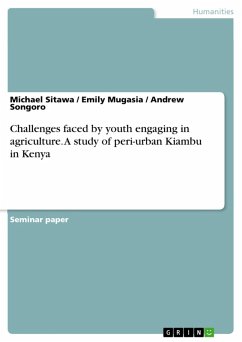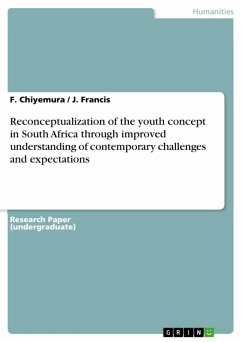Seminar paper from the year 2016 in the subject Sociology - Children and Youth, , course: Development Studies, language: English, abstract: The population of Kenya is a youthful one comprising about 78.31% aged below 34 years. Youth, however, has been declining to engage in agriculture. Notable is that agriculture is the main economic activity of Kenya. The sector has been recording a poor performance in the recent years and the continuous decline of youth engaging in agriculture may lead to a further setback. The effect will be a strain to the achievements of set government goals towards economic growth and development. Therefore, this study sought to assess challenges affecting youth engagement in agriculture in Kiambu County. Specifically, the study sought to find out; to what extent knowledge, land, attitude and credit affect youth's engagement in agriculture. The study was conducted in Limuru Sub County because of the issue of high land fragmentation. The study adopted a survey research design that was cross sectional in nature. It targeted a population of 10,633 youth. The researcher used proportionate sampling to sample 300 youths from the peri-urban population of the constituency. A semi structured questionnaire was administered to both female and male research subjects. Thereafter, quantitative data was analyzed using Statistical Package for Social Science (SPSS) computer software version 11.5. The data was presented in form of frequencies, means, pie chart bar graphs and standard deviation. Pearson's r, correlation was used to determine the relationship between the variables whereas, qualitative data analysis was based on grounded theories and presented along emerging themes. The study concluded that lack of land and a poor attitude towards agriculture were the major causes of non-engagement in agriculture. The study further concluded that agricultural knowledge led to an interest in agriculture engagement. It also found out that in peri- urban areas, because of availability of casual jobs and business opportunities, capital for agriculture was raised through personal and group savings more than borrowing from financial institutions. The study recommended reviving farmer cooperatives, extensive training focusing on importance of youth engagement in agriculture for families and frequent farm visits to demonstrate new farming techniques for youth. Further it recommended formation of structured financial groups by youth.
Dieser Download kann aus rechtlichen Gründen nur mit Rechnungsadresse in A, B, BG, CY, CZ, D, DK, EW, E, FIN, F, GR, HR, H, IRL, I, LT, L, LR, M, NL, PL, P, R, S, SLO, SK ausgeliefert werden.









